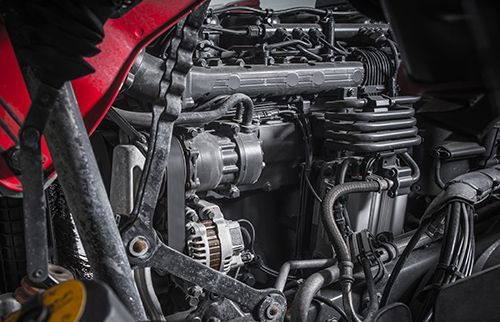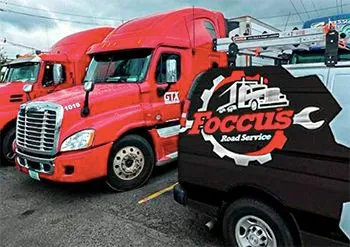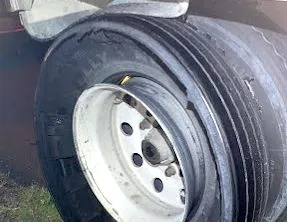Foccus Road Service Blog
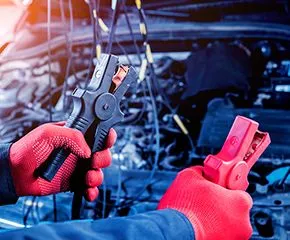
Electrical problems in semi trucks can lead to breakdowns and costly delays if not addressed quickly. Because modern trucks rely heavily on electrical systems for everything from engine performance to safety features, staying ahead of potential issues is crucial for any driver or fleet manager. At Foccus Road Service , we provide mobile semi truck battery replacement and electrical system repair in NJ, PA DE, and MD. Here are four common electrical issues in semi trucks. Dead or Weak Batteries One of the most common electrical problems in semi trucks is a dead or weak battery. Extreme temperatures, aging components, and parasitic drains can all shorten battery life or cause it to fail entirely. Regularly checking battery voltage and ensuring that terminals are clean and secure can help prevent unexpected failures. Alternator Failure The alternator is responsible for charging the battery and powering the truck’s electrical systems while the engine is running. When an alternator begins to fail, you might notice dimming lights, warning lights on the dashboard, or a dead battery after driving. If caught early, alternator repairs can prevent a total electrical failure while on the road. Faulty Wiring and Connectors Wiring issues are another common cause of electrical problems in semi trucks. Over time, wires can become corroded, frayed, or pinched, especially in areas exposed to vibration and moisture. Regular inspections of wiring harnesses and connectors are important for preventing small issues from turning into major problems. Malfunctioning Lights Lighting issues—including headlights, brake lights, and trailer lights—are frequent concerns for truckers. These problems are often caused by burnt-out bulbs, damaged wiring, or corroded sockets. Because functioning lights are essential for road safety and regulatory compliance, any lighting issue should be addressed immediately. Moisture intrusion is a common cause of lighting problems, especially in older trucks or in harsh weather conditions. Mobile Semi Truck Repair in New Jersey, Pennsylvania, Delaware, and Maryland For 24/7 mobile semi truck repair in NJ, PA, DE, and MD, contact Foccus Road Service at 856-335-5009 . We also provide semi truck towing services. Give us a call and we’ll show up ASAP!

Tires are one of the most important safety components on your semi truck. Worn or damaged tires can lead to blowouts, loss of control, and unexpected downtime. Regular inspections and maintenance are essential, but it’s just as important to know when it’s time to stop rotating and start replacing. At Foccus Road Service, we provide expert mobile semi truck tire replacement in NJ, PA, DE, and MD. Here are four signs that your semi truck’s tires need to be replaced. Low Tread Depth Tread depth directly affects your truck’s ability to grip the road, especially in wet or slick conditions. When the tread becomes too shallow, traction suffers and stopping distances can increase. For semi trucks, the Federal Motor Carrier Safety Administration requires a minimum tread depth of 4/32 inch on steer tires and 2/32 inch on other tires. If your tread is approaching these limits—or worse, falling below them—it’s time to replace the tires to maintain safety and DOT compliance. Cracks or Cuts Over time, tires can develop cracks in the sidewalls or deep cuts in the tread. These signs of aging or damage are more than cosmetic. Cracks can indicate dry rot, which compromises the tire’s structural integrity. Cuts could be a sign that the tire has made contact with debris or curbs. Any visible damage that affects the tire’s shape should be treated seriously and could mean that replacement is necessary. Bulges If you notice a bulge or blister on the surface of your tire, this is a red flag for internal damage. These deformities may result from impact with potholes or curbs, and they suggest that the tire’s internal structure has weakened. A bulge can rupture suddenly and cause a dangerous blowout while you’re on the road. Replacing the tire before that happens is the best way to protect both your truck and yourself. Uneven Wear Patterns Uneven wear is often caused by alignment issues or improper inflation. While the underlying issue should be fixed, the tire itself may already be compromised. If one side of the tire is much more worn than the other or if there are high and low spots, it can lead to poor handling. Tires with uneven wear should be inspected by a professional and may need to be replaced. Mobile Semi Truck Tire Replacement & Repair in NJ, PA, DE, and MD For 24/7 mobile semi truck repair in NJ, PA, DE, and MD, contact Foccus Road Service at 856-335-5009 . Give us a call and we’ll show up ASAP to help get you back on the road!
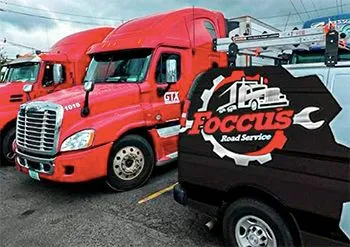
A semi truck's suspension system plays a crucial role in maintaining stability, handling, and driver comfort. When the suspension starts to fail, it can lead to uneven tire wear, poor handling, and increased strain on other truck components. At Foccus Road Service, we provide mobile semi truck suspension repair in NJ, PA. DE, and MD. Here are four signs that your semi truck may have a suspension problem. Uneven or Excessive Tire Wear If you notice that your truck’s tires are wearing down unevenly, this could be a sign of a suspension issue. A properly functioning suspension system helps ensure that weight is evenly distributed across all tires. When parts of the suspension wear out, it can cause excessive strain on certain tires, leading to irregular wear patterns. Not only does this reduce tire lifespan, but it can also affect traction and stability. Rough or Bumpy Ride A semi truck is designed to absorb shocks and provide a relatively smooth ride, even on rough roads. If you start to feel excessive bouncing, shaking, or roughness while driving, your suspension may not be functioning correctly. Worn-out shocks can fail to properly absorb road impacts, leading to an uncomfortable ride. Leaning or Sagging on One Side A semi truck should sit evenly when parked or while driving on level ground. If you notice that one side of the truck is sagging or leaning, it could indicate a broken or weakened suspension component, such as a damaged leaf spring. A truck that leans to one side can lead to uneven weight distribution, affecting handling and increasing the risk of cargo shifting during transport. Strange Noises from the Suspension Clunking, knocking, or creaking sounds coming from the suspension when driving over bumps or turning could indicate worn-out or broken components. Loose or failing shocks, bushings, or springs can lead to unusual noises. Ignoring these sounds can result in more severe damage, increasing the risk of costly repairs and even breakdowns on the road. Mobile Semi Truck Repair in New Jersey, Pennsylvania, Delaware, and Maryland For 24/7 mobile semi truck repair in NJ, PA, DE, and MD, contact Foccus Road Service at 856-335-5009 . Give us a call and we’ll show up ASAP to help get you back on the road!

Semi trucks endure heavy use, often traveling thousands of miles each week. With this level of strain, engine problems can arise that need immediate attention. Ignoring these issues can lead to costly repairs, downtime, and even dangerous breakdowns on the road. At Foccus Road Service, we provide expert mobile diesel engine repair in NJ, PA, DE, and MD. Here’s a look at four common semi truck engine issues that should be addressed ASAP. Overheating Issues An overheating engine is a serious problem that can lead to catastrophic failure if not addressed quickly. Common causes include low coolant levels, a faulty thermostat, a failing water pump, or a problem with the radiator. When an engine overheats, components such as gaskets and cylinder heads can suffer severe damage, leading to expensive repairs. If you notice the temperature gauge rising above normal or steam coming from the hood, pull over safely and turn off the engine before consulting a mechanic. Loss of Power A semi truck engine losing power can be dangerous, especially when hauling heavy loads up steep grades. Loss of power can stem from several issues, including clogged fuel filters, turbocharger failure, or airflow restrictions. A truck struggling to accelerate or maintain speed could indicate an underlying engine issue that needs immediate attention. Ignoring the problem can lead to potential breakdowns. Hard Starting/Failure to Start If your semi truck struggles to start or won’t start at all, the problem could be linked to several factors, including a weak battery, a failing starter motor, or fuel delivery issues. Diesel engines rely on strong battery power to turn over properly, and any weakness in the electrical system can prevent a successful ignition. Fuel system problems can also hinder starting. Addressing these issues promptly can prevent costly delays. Knocking or Unusual Engine Noises A knocking sound coming from the engine is never a good sign. It can indicate problems such as worn bearings or internal engine damage. Ignoring knocking or rattling noises could potentially lead to engine failure. So if you hear unusual sounds from the engine, it’s essential to have it inspected by a professional before the issue escalates. Mobile Semi Truck Repair in New Jersey, Pennsylvania, Delaware, and Maryland For 24/7 mobile semi truck repair in NJ, PA, DE, and MD, contact Foccus Road Service at 856-335-5009 . Give us a call and we’ll show up ASAP to help get you back on the road!
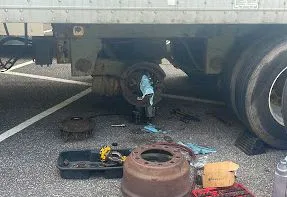
Semi-truck tire blowouts are not only dangerous—they can also lead to costly downtime and repairs. A sudden tire failure on a heavy-duty truck can cause loss of control, putting the driver and other motorists at risk. Understanding the common causes of tire blowouts can help truckers take preventive measures. If your big rig does suffer a tire blowout, our team at Foccus Road Service can show up ASAP to assist. Here are four common reasons that semi truck tires blow out. Underinflation One of the leading causes of tire blowouts in semi-trucks is underinflation. When a tire does not have enough air pressure, it becomes more susceptible to stress and overheating. The sidewalls flex excessively, generating heat that weakens the tire’s structure. Over time, this can cause the tire to fail suddenly. Regularly checking tire pressure and keeping it within the manufacturer’s recommended range can help prevent blowouts and extend tire life. Overloading Exceeding the maximum weight capacity of a truck places excessive stress on its tires. Overloaded tires have to bear more weight than they are designed for, increasing the risk of overheating and structural damage. When a tire cannot handle the added pressure, it may burst unexpectedly. To prevent this, truckers should always adhere to legal weight limits and distribute cargo evenly across axles to minimize strain on individual tires. Road Hazards Potholes, debris, and rough road surfaces can cause significant damage to semi-truck tires. Running over sharp objects can lead to punctures, while hitting potholes at high speeds can weaken the tire’s internal structure. If a damaged tire is not replaced promptly, it can eventually fail while the truck is in motion. Truck drivers should stay alert for road hazards and conduct thorough inspections to identify and replace compromised tires before they lead to a blowout. Tread Wear and Tire Aging Worn-out or old tires are more likely to suffer blowouts due to weakened rubber and reduced tread depth. As tires age, their structural integrity diminishes, making them more vulnerable to failure under stress. Excessive tread wear also reduces traction, increasing the risk of accidents. Regularly rotating tires, checking tread depth, and replacing old or heavily worn tires are essential steps in preventing blowouts. Mobile Semi Truck Tire Replacement & Repair in NJ, PA, DE, and MD For 24/7 mobile semi truck repair in NJ, PA, DE, and MD, contact Foccus Road Service at 856-335-5009 . Give us a call and we’ll show up ASAP to help get you back on the road!



